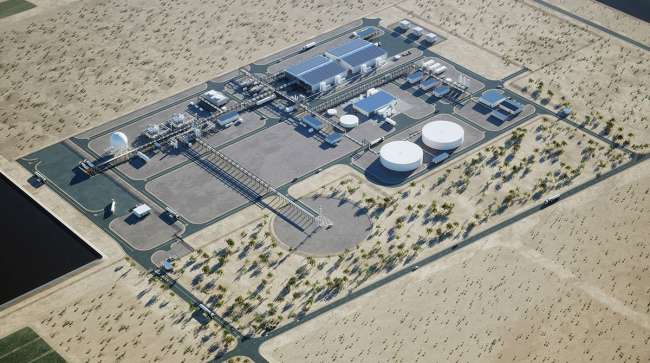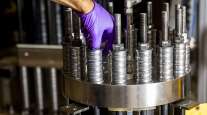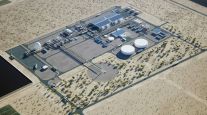Staff Reporter
Phoenix Hydrogen Hub Takes a Step Forward With Plug Power

[Stay on top of transportation news: Get TTNews in your inbox.]
Fortescue Future Industries’ Phoenix Hydrogen Hub in Arizona moved another step closer to fruition after the clean energy specialist inked a memorandum of understanding with Plug Power for the facility’s equipment.
Plug Power would supply electrolyzers, liquefiers, tanker trailers and stationary storage tanks under the memorandum of understanding so green hydrogen can be produced at the hub, which is intended to fuel the needs of Class 8 longhaul trucks, according to FFI.
Green hydrogen is produced from renewable electricity using electrolyzers.
FFI, a unit of Fortescue Metals Group, one of the world’s largest iron ore producers, is also buying electrolyzers from Latham, N.Y.-based Plug Power for the company’s proposed Gibson Island green hydrogen and ammonia project in Brisbane, Australia, it said Oct. 11.
Plug has been chosen as the preferred supplier for 550 MW PEM electrolyzers by Fortescue for their proposed Gibson Island Project in Brisbane, Queensland, Australia. The partnership is part of Fortescue's commitment to developing #greenhydrogen at scale. https://t.co/zJFkRzVL0e pic.twitter.com/dNSeWIfx8i — Plug Power Inc. (@PlugPowerInc) October 11, 2023
The first phase of the Phoenix hub is expected to produce 30 metric tons per day or 12,000 metric tons per year of green hydrogen, which could displace the equivalent of 10 million gallons of diesel consumption a year. A second phase of development under consideration could see hydrogen production quadruple.
FFI bought development rights for the Buckeye, Ariz., project from Nikola in July and the two say the Class 8 truck maker is likely to be one of the first customers for the hydrogen produced by the facility.
Under the terms of the memorandum of understanding, Plug and FFI are set to evaluate investment opportunities in green hydrogen production projects in North America together. The first steps could be Fortescue taking as much as a 40% equity stake in its partner’s 45-metric-tons-a-day plant in Texas and Plug taking as much as a 25% stake in the Phoenix site.

Hutchinson
“It is vital that first movers like Plug Power and Fortescue continue to work together to develop and scale-up the green energy and green hydrogen industries in Australia and North America,” said Mark Hutchinson, Fortescue Energy CEO, adding: “We believe there is strong demand globally for the green hydrogen we will produce and we must move quickly to meet that demand.”
The Fortescue group is also a partner in the Pacific Northwest Hydrogen Hub, which is expected to receive up to $1 billion in bipartisan infrastructure law funding. The Pacific Northwest Hydrogen Hub includes FFI’s proposed green hydrogen production facility in Centralia, Wash.
The Centralia project is currently in the design stage, with full permitting set to follow, Fortescue said Oct. 13. Project construction is anticipated to start in 2026 and continue into 2028, it added.
Meanwhile, Nikola said the Phoenix hub was expected to produce its first fuel by the middle of the current decade, when announcing its deal with FFI. The project is in the final stages of the permitting process, Nikola said in July.
Parts of Nikola’s plan for hydrogen-powered Class 8 semis involves mobile refueling trucks. In July, the company inked a deal to buy hydrogen from Albuquerque, N.M.-based BayoTech. Nikola is set to start taking delivery of hydrogen from BayoTech in Missouri this year and from 2024 onward in California, it said.
Nikola also plans to acquire up to 10 HyFill transport trailers from BayoTech, which will enable distribution of hydrogen between production sites and refueling stations. In turn, BayoTech will buy up to 50 Nikola fuel cell electric vehicle semis over the next five years to make deliveries.
New Mexico is also home to Libertad Power, which has teamed up with Hyundai Motor Co. and fuel supplier Diesel Direct to build a “Southwest Clean Freight Corridor” based on hydrogen-powered trucks. Libertad plans to open a green hydrogen production facility near Farmington, N.M., in 2025.
Diesel Direct would locate hydrogen service centers along major interstates in New Mexico, Arizona, Texas and California, mirroring its existing infrastructure for trucking’s main fuel in the Southwest.
Want more news? Listen to today's daily briefing above or go here for more info
“The distances [in the Western United States] are vast, so you need a lot of future [hydrogen] fueling stations, but in the meantime, you need a trusted partner who’s going to collaborate with you and serve your interest and say, ‘Hey, you’re never going to run out of fuel, your trucks are always going to be fueled,’ ” Joseph Merlino, Libertad Power managing partner, told an Oct. 5 Atlantic Council roundtable.
Some truck stop owners, however, are already looking to replicate the traditional diesel supply model in the hydrogen sector. On Sept. 28, Love’s Travel Stops unit Trillium Energy Solutions signed a memorandum of understanding with hydrogen producer Air Liquide. The initial terms will see 150 metric tons per day of hydrogen supplied, enough to meet the needs of at least 2,000 heavy-duty vehicles.




